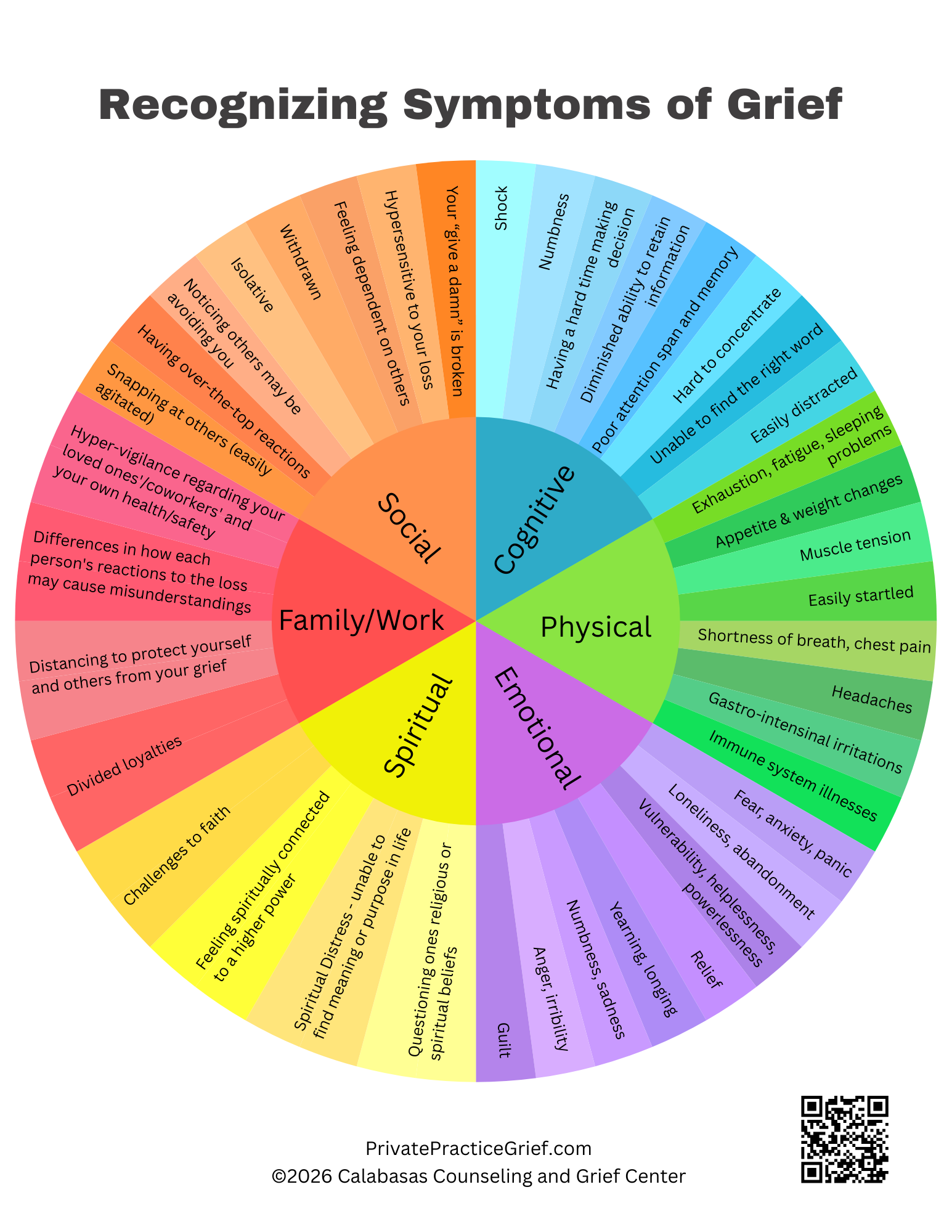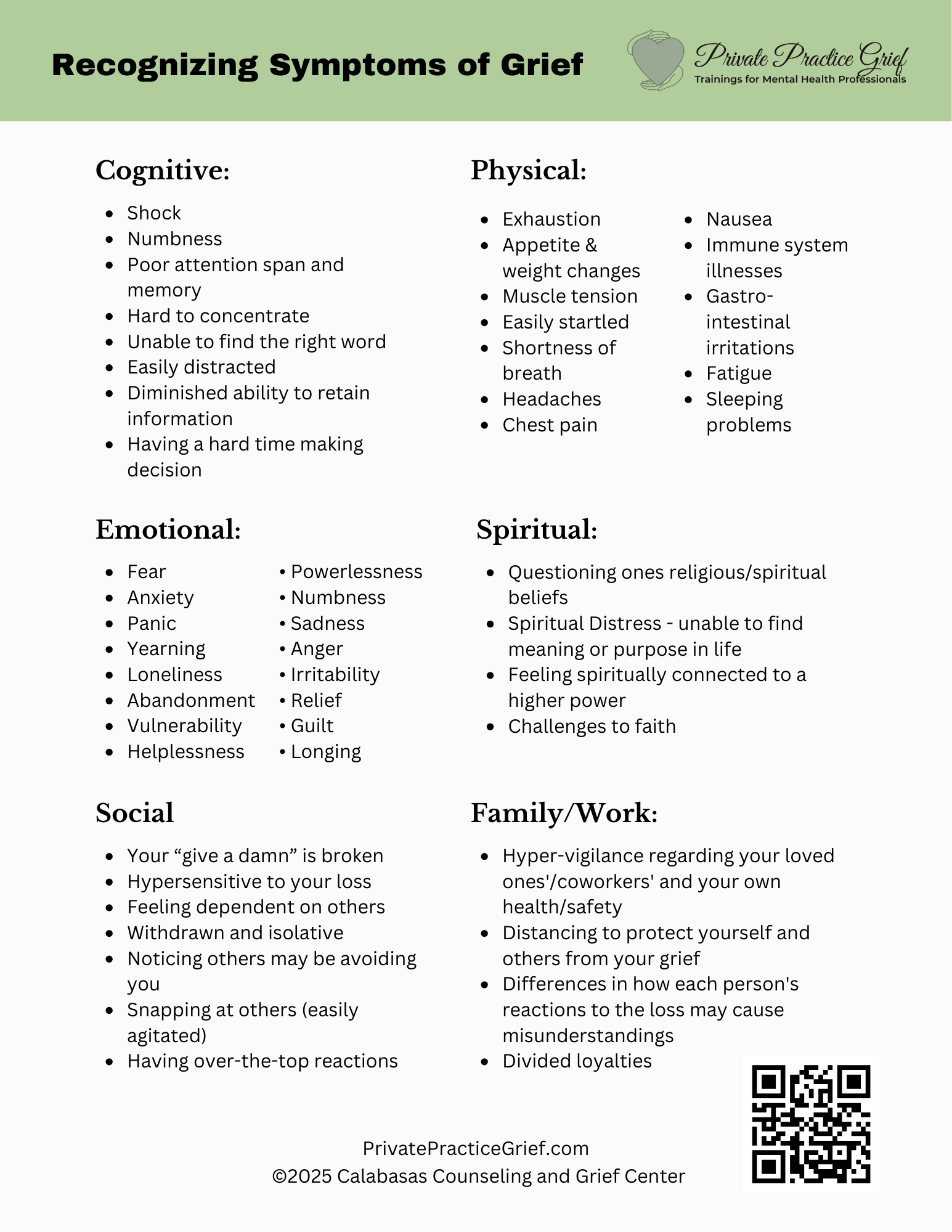
Recognizing the Signs and Symptoms of Grief
Grief is a natural response to loss, but it manifests differently for everyone. Understanding the signs and symptoms can help you or someone you care about navigate this complex emotional process. Below, we outline the various ways grief can affect us physically, emotionally, cognitively, spiritually, socially, and within family or work settings.
Cognitive Symptoms
Shock: Difficulty processing the reality of the loss.
Poor Attention Span and Memory: Struggling to retain details or focus.
Hard to Concentrate: Difficulty staying on task.
Unable to Find the Right Word: Disruption in verbal expression.
Easily Distracted: Difficulty maintaining focus.
Diminished Ability to Retain Information: Forgetfulness or confusion.
Difficulty Making Decisions: Feeling overwhelmed by choices.
Physical Symptoms
Exhaustion: Persistent fatigue or low energy levels.
Appetite & Weight Changes: Overeating or loss of appetite.
Muscle Tension: Aches or tightness in the body.
Easily Startled: Heightened physical responses.
Shortness of Breath: Feeling physically constricted.
Headaches and Chest Pain: Physical discomfort caused by emotional strain.
Nausea and Gastrointestinal Issues: Stomach upset or illness.
Immune System Illnesses: Increased susceptibility to sickness.
Fatigue and Sleep Disturbances: Trouble sleeping or oversleeping.
Disclaimer:
Physical symptoms associated with grief, may overlap with symptoms of medical conditions. While these are common responses to loss, it’s essential to encourage clients to consult a healthcare professional if symptoms persist, worsen, or cause significant concern. Addressing physical health alongside emotional and mental well-being ensures a comprehensive approach to healing.
Emotional Symptoms
Fear, Anxiety, and Panic: Overwhelming feelings of worry or dread.
Yearning and Loneliness: Deep desire for connection or the presence of what’s been lost.
Vulnerability and Helplessness: Feeling emotionally exposed or powerless.
Numbness and Sadness: Feeling disconnected or deeply sorrowful.
Anger and Irritability: Irritation or frustration toward the loss or others.
Relief and Guilt: Complex emotions often intertwined.
Longing: Intense yearning for what’s gone.
Spiritual Symptoms
Comfort in Spirituality: Feeling spiritually connected to a higher power.
Spiritual Distress: Unable to find meaning or purpose in life
Challenges to faith: Feeling closer to or questioning spiritual beliefs.
Spiritual Doubt: Questioning one’s religious or spiritual beliefs.
Social Symptoms
“Give a Damn” is Broken: Struggling to care about daily matters.
Hypersensitivity to Loss: Heightened awareness of personal grief.
Feeling Dependent on Others: Increased need for support.
Withdrawn and Isolative: Pulling away from social interactions.
Noticing Avoidance by Others: Observing others avoiding discussions about grief.
Easily Agitated: Snapping or reacting strongly to small issues.
Over-the-Top Reactions: Intense responses to minor events.
Family/Work Symptoms
Hyper-Vigilance: Increased concern for loved ones’ or coworkers’ well-being.
Distancing: Avoiding others to manage personal grief.
Differences in Reactions: Challenges caused by varying grief responses within a group.
Divided Loyalties: Feeling torn between personal grief and family/work obligations.
To deepen your understanding of grief and enhance your ability to support clients, explore the specialized online trainings offered by Private Practice Grief. Our programs are uniquely tailored for mental health professionals, focusing on contemporary grief theories, practical skills for empathetic listening, narrative therapy techniques, and psycho-educational resources. We also address diverse grief experiences, such as pet loss, family dynamics, and cultural perspectives on mourning, equipping you with tools to guide clients through their healing journeys. Join a community of professionals dedicated to compassionate, evidence-based grief counseling. Keep updated on any new online trainings by joining our Facebook group or following my Instagram.
List Version:
Read more
-

Unhelpful Things Therapists Say & Do
Secrets told to a grief therapist about experiences with well-meaning clinicians
-

Types of Losses
Grief has often been only associated with the death of a loved one.








